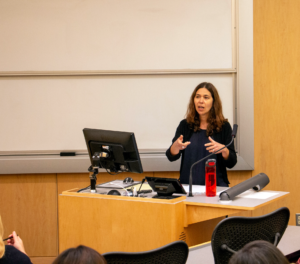
In the late 1990s, a series of media reports and peer-reviewed journal editorials about clinical trials of HIV/AIDS drugs in developing countries had far-reaching effects still felt to this day, according to Sarah Rodriguez, PhD, ’11 GME, lecturer of Medical Education.
These trials triggered discussions about ethics in science and barriers to healthcare access around the world, said Rodriguez, who delivered a talk on September 5 as part of the Medical Humanities and Bioethics Lunchtime Montgomery Lectures series.
“This controversy comes right at the crux where HIV lays bare that there are huge inequities in global health,” Rodriguez said. “I’ve been fascinated with this for a while because it’s seen as a turning point.”
In September 1997, a New York Times cover story revealed that for the past two years, the United States government had been funding and conducting “controversial” studies on women infected with HIV. Some women were given a drug called AZT, that could prevent transmission of the virus, but other women received just a placebo.
The same day, an editorial appeared in the New England Journal of Medicine, decrying this particular study and more than a dozen others, as the use of placebos when an efficacious therapy exists would have been unethical in the United States. However, the field had few guidelines for resolving differences between the countries that sponsor science and those that host it, Rodriguez said. In addition, the controversy highlighted bioethics’ myopic focus on scientific trials at the expense of patient care, when the two are deeply intertwined.
This was compounded in the nature of perinatal HIV transmission, according to Rodriguez.
“The full course AZT trials were concerned the prevention of HIV transmission to the fetus rather than concerning the care of the women,” she said. “For example, during the third international conference on AIDS in 1987, women were often spoken of in the terms of being vessels of infection for men and vectors of perinatal infection, fetuses with women portrayed as almost as invisible pass-throughs.”
The lack of attention to women’s health was an endemic problem in science, as the male body was seen as the normative body while the woman’s body was viewed as difficult to study thanks to “pesky hormones,” Rodriguez said.
Indeed, restrictions on including women in clinical trials had only recently been lifted in the early 1990s, thanks to activists who agitated for legislative action, but by the time this story broke, three out of the four AIDS trials including women were concerned with perinatal transmission.
The treatment barrier also ran across geographic lines; women in developing countries weren’t getting the high-cost drug cocktail that turned HIV into a relatively manageable condition, according to Rodriguez.
“It became this global divide, where women with money and means, in high income countries, have access and if you don’t fit in that geographic context, you don’t get access to treatment,” Rodriguez said. “The perinatal transmission trials proved to be real ethical lightning rod and international discussion on treatment and drug access. These trials accelerated demands for access to treatment globally.”
The Medical Humanities and Bioethics Lunchtime Montgomery Lectures address diverse topics within the field of bioethics, and are sponsored by the Center for Bioethics and Medical Humanities.






